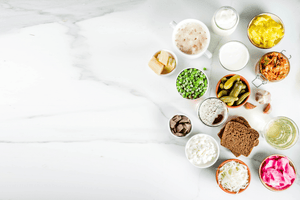Winter is just around the corner, there’s no better time to look after your immune system to ensure it is working at its best. An easy way to support your immune system is by looking at what you do every day and making several small lifestyle changes.
We've put together 5 top tips to help you get started.
1. Eat a colourful, prebiotic-sourced diet.A strong immune system needs a healthy, balanced diet. The essential nutrients for our body are protein, fibre, fat or micronutrients (Vitamins A, C, D) and key minerals such as iron, zinc, etc. Most of them can be found in a variety of food, therefore, aim to eat a rainbow of protein, vegetables and fruits daily to help support your immune system.
Besides that, food sources of prebiotics such as onions, garlic, oat, etc can also support your immune health. Prebiotics have a key role in feeding our gut microbiome, acting as a fertiliser for beneficial species of bacteria to grow. After all, 70-80% of our immune cells are located in the gut, we should take care of our gut with a balanced diet, or if struggling to get enough prebiotics from our diet, consider using gut health supplements.
2. Vitamin supplementationWhilst a healthy and balanced diet is the most effective way to support your immune health, vitamin supplementation may also be helpful in some cases. For instance, the lack of sunlight during wintertime means our body may require extra vitamin D. Although a small amount can be found in oily fish and fortified foods, many of us may need to add more vitamin D through supplementation to promote bone health and support the normal function of our immune system.
There are many different vitamin supplements on the market, however, studies show that increased consumption of vitamin C, D3 and zinc would contribute to the normal function of the immune system. You could look for products containing these vitamins or immunity supplements to support your immune health. When shopping for health supplements, choose the best-quality versions you can - without added sweeteners and artificial colours.

Regular exercise is a key part of maintaining your immune health. In addition, it helps to improve your sleep quality and manage your stress level.
To keep your body active during the wintertime, especially with many of us working from home more often, the recommended 150 minutes a week is a great aim, but even 10 minutes of brisk walking a day has major health benefits. Don’t forget to rehydrate afterwards.
4. Manage your stressHigh cortisol released in chronic stress directly affects the way the immune system works. When the body is in constant fight or flight mode, it prioritises survival rather than rest and repair. This stress response restrains your immune system, making fighting infection much harder.
Deal with stress before they have the chance to build up. Allow yourself downtime for self-care and connecting with others for emotional support. Meditation and deep breathing can also help you manage your stress levels. See more ways to deal with stress here.
5. Sleep soundly
Another way our body restores itself is sleep and only 1/3 of us get the recommended 7-8 hours per night. Sleep is an important way to help your body rest and repair, which contributes to both innate and adaptive immunity.
Studies indicated that some immune system parts become functional while we sleep at night. Try to get natural light exposure during the day to help set your body clock, avoid caffeine after midday, maintain a consistent sleep and wake time, wind down at least half an hour before bed with no blue light from screens and avoid salty, heavy meals in the evening. Together, these tips may help you to sleep more soundly and keep your immune system ready to be called into action when needed.
- A Valses. Walter. I Spector. (2018). Role of the gut microbiota in nutrition and health
- D Patrick, G Findon, & T Miller, (1997). Residual moisture determines the level of touch-contact associated bacterial transfer following hand washing. Epidemiology & Infection
- Irwin (2002) Effects of sleep and sleep loss on immunity and cytokines. Brain behaviour and Immunity
- G Egger (2012). Lifestyle medicine, lifestyle, the environment and preventive medicine in health and disease. Academic Press, 3rd
- C Aranow.(2011). Vitamin D and the Immune system. J Investig Med
- D Taylor, K. Kelly, M. Lohut (2017). Is insomnia a risk factor for decreased influenza vaccine response? Behav Sleep Med
- PD Schley (2002). The immune-enhancing effects of dietary fibre and prebiotics
- H Hemila, E.Chalker, (2013). Vitamin for accenting and treating the come cold Cochrane Database Syst Rev
- Singh, R Das (2013). Zins for the cost. Cochrane Database Syst Rev. 18(6)
- Suni, K. Truong (2022). How Sleep Affects Immunity https://www.sleepfoundation.org/physical-health/how-sleep-affects-immunity
- Besedovsky, L., Lange, T. and Born, J., 2012. Sleep and immune function. Pflügers Archiv-European Journal of Physiology, 463(1), pp.121-137.








